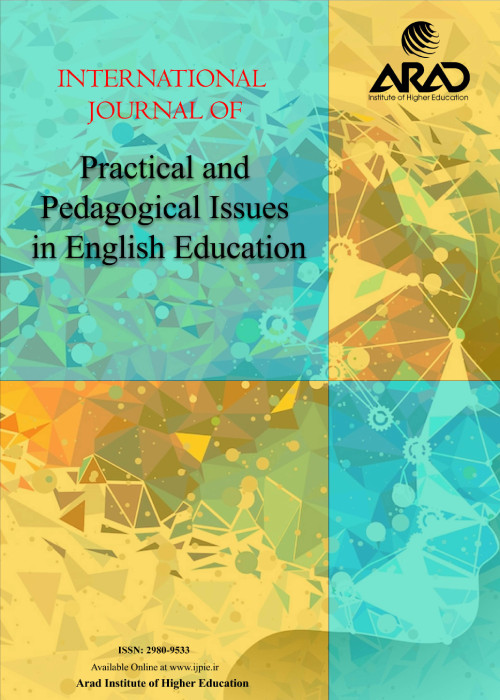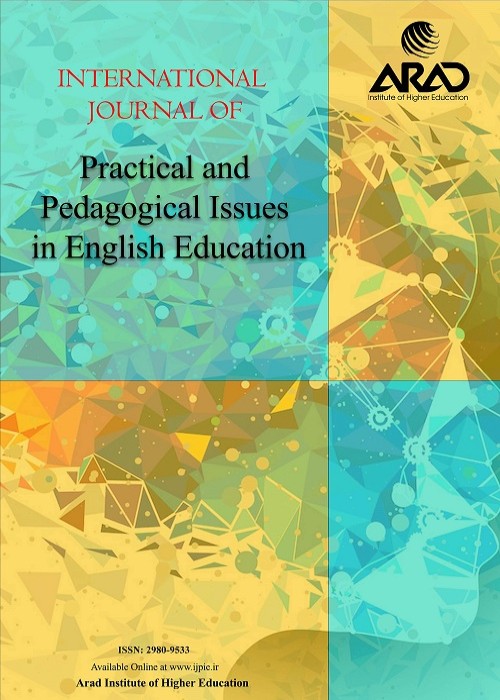فهرست مطالب

Journal of Practical and Pedagogical Issues in English Education
Volume:1 Issue: 4, Dec 2023
- تاریخ انتشار: 1402/09/10
- تعداد عناوین: 6
-
Pages 1-15This study aimed to investigate Iranian EFL learners’ expression of regrets in four main contexts. A qualitative case study design was adopted to address the research question. The participants were 3 male Iranian EFL learners. Sadra and Ata were 19 and Mehrdad was 20. The participants were chosen through purposive sampling and spoke Azeri Turkish as their mother tongue. The contexts used for the purpose of the study were a) classroom, b) shopping mall, c) park and d) coffee shop. The participants were instructed in six EFL classes to obtain an understanding of specific syntactic categories and lexical items related to the expression of regrets by their EFL instructor, the second researcher. High Inference observation (HIO) was used to observe the participants’ speaking competence in expressing their regrets at two phases (the first three months and the last two months). Through initial data coding and comparison of the participants’ use of syntactic and lexical items which were investigated during the two time periods (the first three months and the last two months), it was tangible that the participants failed to express their regrets due to lack of syntactic lexical competence and inadequate practice in their first three months role plays in comparison with their linguistic choices related to expression of regrets during the last two months. The participants’ expression of regrets in the four main contexts pursued for five months up to the time when the researchers reached saturation and were empirically confident about the participants’ improvement in this case study. Scrutiny of the data entries (84 extracted data) revealed that the participants could improve their speaking competence in expressing their regrets in five months.Keywords: Expression of regrets, speaking competence, case study
-
Pages 16-29
The significance of emotions and the cultivation of empathy in development within the realm of education has garnered increasing attention from educators in recent years. Likewise, the emotional intelligence (EI) of educators has emerged as a central factor influencing their effectiveness in educational contexts. Individuals possessing elevated levels of EI demonstrate a heightened awareness of their own emotions as well as those of others, enabling them to regulate their emotions in a manner that elicits desirable behavior from others. This study aimed to present a comprehensive model elucidating the interrelationships among teachers' effectiveness, empathy, and emotional intelligence, employing structural equation modeling (SEM) as the analytical approach. Accordingly, a sample of 201 English teachers at the institutional level from different cities in Iran participated in a quantitative correlational study. The results of Pearson correlation analysis revealed a statistically significant yet weak positive association between Emotional Intelligence and empathy. Moreover, empathy exhibited a positive and significant correlation with teachers' effectiveness. The findings further indicated a moderate positive correlation between Emotional Intelligence and effectiveness. Additionally, a positive path was observed connecting Emotional Intelligence and Empathy. Furthermore, both empathy and EI were found to be predictive of teachers' effectiveness. Hence, it can be concluded that the proposed model had an acceptable fit with the empirical data.
Keywords: language teachers, effectiveness, Empathy, Emotional intelligence, structural equation modeling -
Pages 30-46
One of the most important accomplishments for academics is to publish their research outputs in accredited journals. Journal editors and reviewers often call for an extensive range of modifications before granting acceptance. The present study delved into the type and rate of these revisions on the manuscripts submitted to highly indexed ELT journals by Iranian PhD students in applied linguistics. It explored the proportion and focus of language-related revisions in terms of grammar, lexis, and discourse. To this end, 24 published research papers written by Iranian PhD students along with their first draft manuscripts were selected, and their introductions, results, and discussions were analyzed and cross-checked to identify language-related modifications. The results showed that the most frequent type of modifications required by journal editors and reviewers were discoursal followed by grammatical and lexical revisions. The lexical revisions required were all unwarranted. The findings can help young researchers in applied linguistics to preemptively minimize the need for language-based revisions in their academic writings through addressing the identified problematic areas in their manuscripts.
Keywords: academic writing, discoursal revisions, English for research publication purposes, grammatical revisions, lexical revisions -
Pages 47-66
Vocabulary learning has always been meaningful in second language acquisition, which raises the proposition of strategies for learning and teaching vocabulary. This study intended to investigate the effect of one strategy in vocabulary learning which is mobile-assisted concept mapping on self-regulation capacity and vocabulary acquisition. Mind Meister was utilized to draw maps in learning vocabulary. To this aim, 45 male and female Iranian EFL learners were selected as study participants. The pre and post-tests for vocabulary self-regulation and vocabulary acquisition were given to them. Two experimental groups received concept mapping materials as treatment, and the third group was considered the control group. The data were analyzed using paired sample t-test that revealed the significant enhancement of self-regulation capacity among Iranian EFL learners. Moreover, both concept mapping and conventional methods effectively improved vocabulary acquisition, but the participants' enhancement in vocabulary acquisition in the experimental group was more significant. The data were also gathered from interviews which collected the students' attitudes toward using concept mapping to control self-regulation capacity. This research may help encourage teachers to use concept mapping with learners, a useful tool that improves self-regulation skills and enhances the acquisition of vocabulary.
Keywords: Concept Mapping, Iranian EFL learners, self-regulation, vocabulary learning -
Pages 67-77Language as the sole mean of communication has always been a tool for power abuse by authorities and other media owners through various channels and tribunes worldwide to divide people based on ethnicity and nation-state; this has become a widespread phenomenon in the present age and has led to a cultural and moral separation among people across the globe. Accordingly, due to the political incidents over the last decades between Iran and most Western countries, people living in Western countries are misguided by biased language manipulation and interpretations by authorities. As a multi-disciplinary research, the present study attempted to provide a realistic and scientific viewpoint toward language manipulation by adopting Discourse Analysis (DA) methodology. Two well-known literary works written by female authors were chosen to be analyzed, namely, A Room of One's Own and Suvashun. Halliday's (1985) framework was utilized to probe the subject matter and extract explicit and implicit ideational concepts. Results have indicated similarities and differences in the feminine discourses in the research samples. The current study's findings shall benefit intellectual and academic individuals in particular and the whole society at large.Keywords: Discourse Analysis (DA), Halliday (1985), literary work, Perception
-
Pages 78-81Achilles in the Odyssey prefers being a surf in the land of living to be a king in Hades. His attitude to heroism in The Odyssey contradicts his valorous character in The Iliad. Critics have viewed such contradiction as either a paradoxical rejection of heroism or a pessimistic view of death in general. This paper aims to look at the paradox from a different angle. It is the frozen nature of Hades that Achilles grieves most. In Hades, he is a psyche among other psyches who cannot fulfill any ideal including aristeia or to excel others. Hades is a place of stasis and passivity in sharp contrast to the moving world of the living. Achilles who once strove under the shining sun on the battlefield is now an idle shadow doing nothing. Thus, the stasis in Hades contrasts the strife in the living world and is the cause of Achilles’ paradoxical attitude to heroism.Keywords: Heroism, Hades, stasis, strife, aristeia


